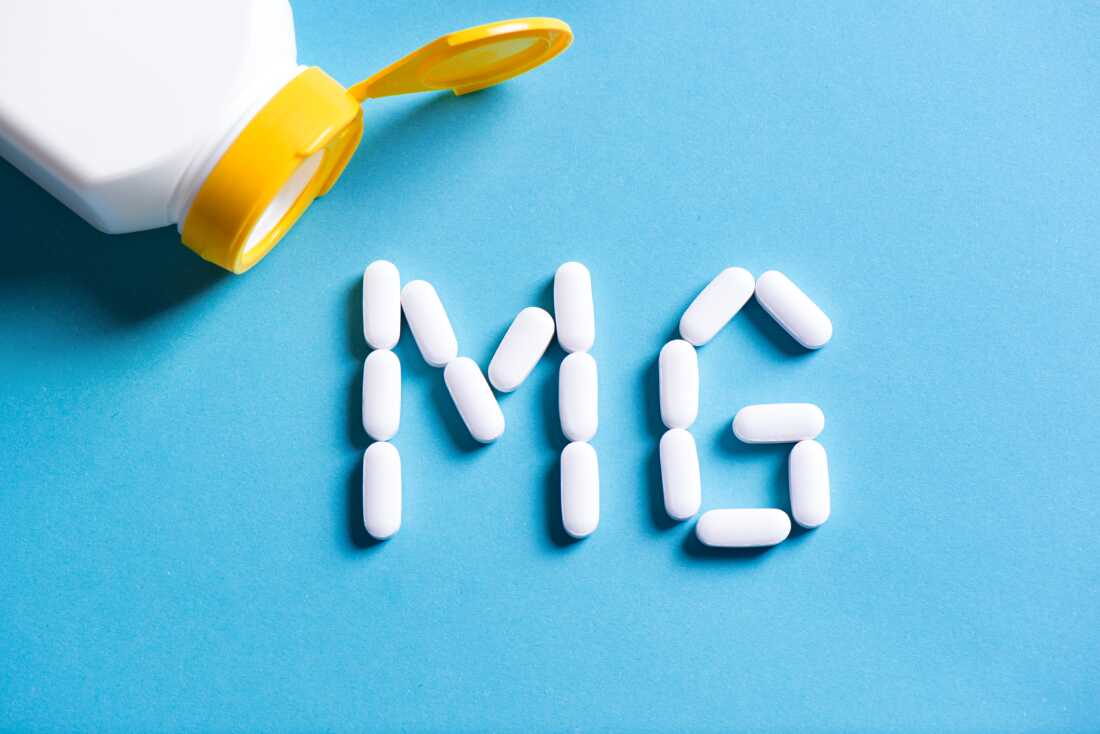
Magnesium is important for many functions in the body, including regulating muscle and nerve function, blood sugar levels and making proteins and bones.
Cities Images/Getty
hide description
toggle caption
Cities Images/Getty
Dr. Chester Wu is a psychiatrist and sleep specialist in Houston. Lately, he says he’s had a lot of patients asking him, ‘Hey doc, should I take magnesium supplements to help me sleep?
“It’s been something I feel like I’ve been talking to patients a lot about in the last year or two,” says Wu.
Some of that interest is fueled by social media. Take, for example, the sleeping girl mocktail that went viral on TikTok. It’s a mixture of magnesium powder, tart cherry juice and prebiotic soda that you drink about half an hour before bed.
And while a mocktail before bed may sound like a bad idea, sleep expert Dr. Fariha Abbasi-Feinberg says it might be worth a try.
If you ask me, ‘Can I try a sleeping girl?’ I would say, ‘Sure. It probably won’t hurt you, but start with a low dose of magnesium’” like half a dose or less, he says.
But if you’re looking for hard science that proves it works, you won’t find it.
Abbasi-Feinberg, who is the director of sleep medicine at Millennium Physician Group in Fort Myers, Fla., and every sleep specialist I spoke with emphasized that there is not much evidence at all about magnesium and sleep. There isn’t enough data for the American Academy of Sleep Medicine to have a policy statement on it, says Abbasi-Feinberg, who is on the group’s board of directors.
What we do know is that magnesium is an essential mineral that plays a role in many bodily processes, including bone health, energy production, muscle relaxation and the nervous system.
And there are several theories about how magnesium can help with sleep, says Tyish Hall Brown, director of sleep medicine at Children’s Hospital in Washington, DC.
For one, Hall-Brown notes that magnesium is involved in the production of melatonin, a hormone that helps regulate your sleep cycle. Magnesium also helps relax your muscles from cramping. And he says there is an idea that it can help reduce anxiety, so that when a person tries to sleep, “he doesn’t worry like, maybe, about what happened yesterday, what will happen. And it can make a person sleep better.”

But again, that’s just an unproven theory.
Wu says people with other medical conditions, such as kidney disease, should be careful with magnesium, so it’s important to talk to your doctor before trying it. But in general, he says, as long as you don’t take too much — because that can cause stomach pain — magnesium won’t hurt, and it can help. He says frankly, he has worked with many patients who have reported a positive response to magnesium.
“Whether it’s a placebo [effect] or actually, like benefiting from magnesium – I try not to worry too much about that, because at the end of the day, they feel better,” Wu says.
He notes that most Americans don’t get enough magnesium in their diet, so a little extra isn’t bad. Although he would prefer that people get it from their diet – leafy greens such as spinach and kale, seeds, nuts, salmon, beans, whole grains and yogurt are all good sources of magnesium.

Some advice on social media also suggests giving magnesium to children. But if there is little evidence when it comes to adults, there is virtually none when it comes to using the supplement as a sleep aid in people under the age of 18. says Dr. Cora Collette Breuner, a pediatrician at Seattle Children’s Hospital and professor of pediatrics. University of Washington.
Breuner says he uses magnesium in some teenage patients — not as a sleep aid, but to treat migraines and tension headaches. “I don’t know exactly how this works, but they respond to magnesium,” says Breuner, who is the lead author of an upcoming policy statement from the American Academy of Pediatrics on the safety of -supplements.
Dr. Beth Malow, a professor of neurology and pediatrics at Vanderbilt University whose research focuses on sleep issues in children with neurodevelopmental disorders, notes that there is some clinical evidence that magnesium is I can help children with ADHD and autism – not as a sleep aid. but in general. Sleep problems are common in children with autism and ADHD, and he usually starts by recommending melatonin, which is best studied in this population of children. But if that doesn’t work, “I’m open to them trying magnesium,” Malow says.
Breuner notes that magnesium dosing depends on age and body weight, and he starts his pediatric patients on doses much lower than what the bottle recommends. He says parents should talk to their pediatrician if they’re interested, and make sure they’re buying supplements from a reputable source that’s been reviewed by a third party, like the US Pharmacopeia..
But before I got any sleep aid, all the doctors I talked to said it was important to focus on sleep hygiene first. That means avoiding large meals before bed, sleeping in a dark, quiet room, maintaining a regular sleep schedule, and of course, staying off the screen before you hit the hay.
This story was edited by Jane Greenhalgh
#Americans #dont #sleep #magnesium #supplements